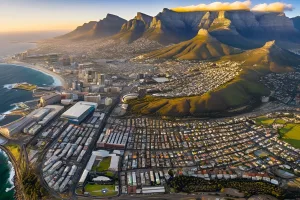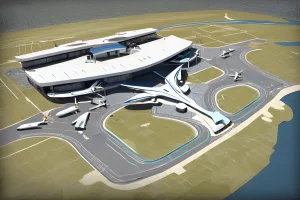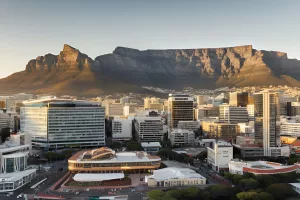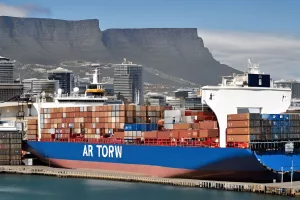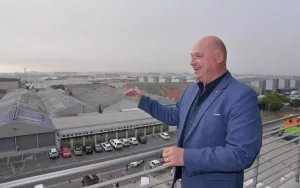The GovernmentBusiness Partnership in South Africa is an exciting teamwork effort launched by President Cyril Ramaphosa to boost the economy and create jobs. At a special event in Johannesburg, leaders from both the government and businesses gathered to celebrate their progress and plan for the future. This partnership aims to solve tough economic problems and has already led to improvements, like better electricity supply and more support for young job seekers. With everyone working together, South Africa is on a hopeful path towards growth and a brighter future for all.
Deputy President Shipokosa Paulus Mashatile has a bright dream for South Africa’s future with the UK, focusing on stronger trade and investment. He believes that by working together, both countries can create more jobs, fight climate change, and grow their economies. During his visit to London, he spoke passionately about the need for cooperation, emphasizing that stronger ties would benefit everyone. His vision is clear: a united effort can lead to a better life for all, showcasing the power of friendship and collaboration.
Cape Town is gearing up for an exciting property auction that will showcase 44 unique properties, from stunning beach lots to industrial sites. This event aims to boost the city’s economy and improve community services by reinvesting the money earned from sales. Alderman James Vos highlights the importance of these auctions in unlocking land for development, ensuring that both investors and local communities benefit. With diverse offerings across the city, this auction is a golden opportunity for growth and change in Cape Town.
South Africa and the United States are looking forward to a bright future in business together. South Africa wants to attract $100 billion in investments over the next five years, focusing on exciting areas like green energy. President Cyril Ramaphosa shared this vision at a big meeting in New York, highlighting how important partnerships are for both nations. With strong support for clean energy and a commitment to growth, South Africa is ready to shine on the global stage, inviting US businesses to join in this journey of shared success and prosperity.
Africa’s critical minerals are treasures that can power the world’s shift to green energy. With 30% of these minerals found in SubSaharan Africa, they can spark jobs and boost the economy if processed locally. South Africa is leading the way, aiming to turn its mineral wealth into sustainable growth while ensuring fairness for its people. By teaming up with the U.S. and focusing on responsible mining practices, Africa hopes to create a brighter future filled with opportunity and innovation.
Cape Town’s economic growth is boosted by a network of 11 Special Purpose Vehicles (SPVs), each representing a different industry sector. These collaborations have resulted in a combined economic impact of R45 billion and the creation of 50,000 jobs in the last five years. The SPVs act as accelerators that enhance workforce skills, generate employment, and foster economic growth, reshaping the future of Cape Town. The city’s comprehensive support for these collaborations aims to cultivate a more businessconducive environment and empower individuals.
Cape Town is on the brink of economic prosperity with the introduction of the Trusted Tour Operator Scheme (TTOS). The new visa program, set to launch in January 2025, streamlines the visa application process for select tour operators from China and India, opening opportunities for a robust influx of tourism. The TTOS is expected to revitalize the tourism industry in South Africa and attract more Chinese visitors to Cape Town, positioning the city as a global hotspot. This strategic initiative instills confidence in the country’s commitment to economic advancement and transforming Cape Town into a leading destination.
FlySafair is expanding its flight routes in South Africa by launching a new direct route between Cape Town and Windhoek, Namibia. The airline will operate two flights per week on this new route, with ticket prices starting at R1 800. In addition, FlySafair also unveiled a Cape Town to Kruger route earlier this year, demonstrating the airline’s commitment to improving access to central destinations and stimulating economic growth. These new routes aim to make air travel more accessible and affordable, encouraging more visitors to explore South Africa’s natural wonders.
Cape Town is a great place for job seekers, with countless fulltime job opportunities and a commitment to human capital development. The city’s recruitment process is designed to ensure fairness and healthy competition, selecting the most deserving and qualified candidates. Cape Town’s workforce is a perfect blend of talent and diversity, contributing unique experiences, skills, and viewpoints. The city is dedicated to nurturing its employees by providing them with opportunities for training and learning, creating a nurturing environment that promotes talent, encourages growth, and shapes a promising future. Cape Town’s transformation into an employment hub serves as a model for cities around the globe.
South African smallscale fishermen are standing up against TotalEnergies’ offshore oil and gas exploration plans amid fears that they will ruin their livelihoods. Led by fisherman Sifiso Ntsunguzi, the community is concerned about the environmental impact of the proposed sites and the potential loss of fish, which is their main source of food and income. Environmental group Green Connection has sued the government over TotalEnergies’ environmental authorisation, and the company’s promises to reach netzero carbon emissions by 2050 are being scrutinised. The conflict highlights the challenges of balancing economic development with environmental preservation.
The Majestic Transformation of Cape Town’s Skyline: The Cape Winelands Airport Expansion
Cape Town’s Cape Winelands Airport is undergoing a massive $460 million expansion, with plans to extend a runway to 3,500m and become the most ecofriendly airport in the world. The project is expected to create 60,000 new jobs and serve as a backup for Cape Town International during emergencies, reducing carbon emissions and conserving fuel. The expansion is set to transform Cape Town’s skyline, bringing economic growth and environmental responsibility to the forefront.
**Boosting the Western Cape’s Economy: The Impressive Gains from Forthcoming Business Events**
The Western Cape is experiencing an economic revival thanks to the business events industry, with 30 new bids set to generate over R1 billion in economic output and create jobs across multiple industries. The events range from international congresses to global conferences, and the Western Cape’s stateoftheart facilities make it an attractive destination. The region has a track record of successfully hosting international events and is committed to doubling tourist numbers by 2035, with business events playing a crucial role in achieving this goal.
Deputy President of South Africa, Shipokosa Paulus Mashatile, delivered a powerful speech at the African United Business Confederation event, emphasizing the importance of responsible leadership and collaboration in driving economic growth. Mashatile highlighted the need for inclusivity, eradicating corruption, prioritizing energy supply and infrastructure development, and addressing skills shortages to prepare future generations of leaders. He urged leaders to endorse policies that uplift marginalized communities and create opportunities for all individuals to engage in the economy, and concluded by emphasizing the collective responsibility to pave the way for a brighter future for all.
The Port of Cape Town has announced that it will welcome private sector partnerships to address the inefficiencies that have plagued the port for some time. This move is expected to generate a significant R6 billion in exports, create around 20,000 jobs and yield over R1.6 billion in additional taxes over five years. The initiative has been championed by Alderman James Vos, who has called for a strategic transition towards private sector involvement. However, caution and due diligence are advised when scrutinising bidders to avoid potential risks.
The Business Retention and Expansion unit in Cape Town is transforming the city’s industrial landscape by placing businesses at the core of its strategy. Through proactive action teams, the unit leverages the power of multiple city departments to enhance economic resilience, promote energy security, alternative energy solutions, and transport infrastructure. The unit’s initiatives have yielded tangible results, such as prospering businesses, dynamic city districts, and a thriving economy. Through partnerships and proactive initiatives, Cape Town continues to attract investment and job creation, ensuring ongoing economic stability for the entire city.
South Africa and China have a thriving partnership that has developed over the past 25 years, resulting in significant economic growth and the creation of over 400,000 jobs in South Africa. The Comprehensive Strategic Partnership is part of a wider 10year Strategic Programme of Cooperation that emphasizes socioeconomic enhancement and shared growth. These vibrant trade relations address poverty, inequality, and unemployment, promoting engaged citizenship and social contracts aimed at achieving development objectives. South Africa celebrates three decades of democracy and freedom, promoting a shared vision for quality growth.



